Case Study Analysis: Brick Moving Company, HRM, and BFOR Policies
VerifiedAdded on 2020/03/15
|6
|1157
|70
Case Study
AI Summary
This case study examines the Brick Moving Company's Human Resource Management (HRM) practices, specifically focusing on Bona Fide Occupational Requirements (BFOR). The assignment delves into the company's policies regarding recruitment, selection, and training, highlighting the importance of BFOR in ensuring efficient performance. It analyzes the company's job descriptions for loaders/movers, emphasizing the need for employees to meet the specified work hours. The study considers external legislation, including federal laws and international trade standards, to ensure non-discriminatory practices. It also addresses BFOR accommodations, emphasizing the importance of considering candidates who meet the requirements through training and development. The case concludes with a decision on whether to employ a candidate who does not meet the BFOR, providing insights into handling complex HRM situations. The assignment references key concepts like human rights, code of ethics, safety legislation, WCB, and employment standards in implementing an effective BFOR policy.
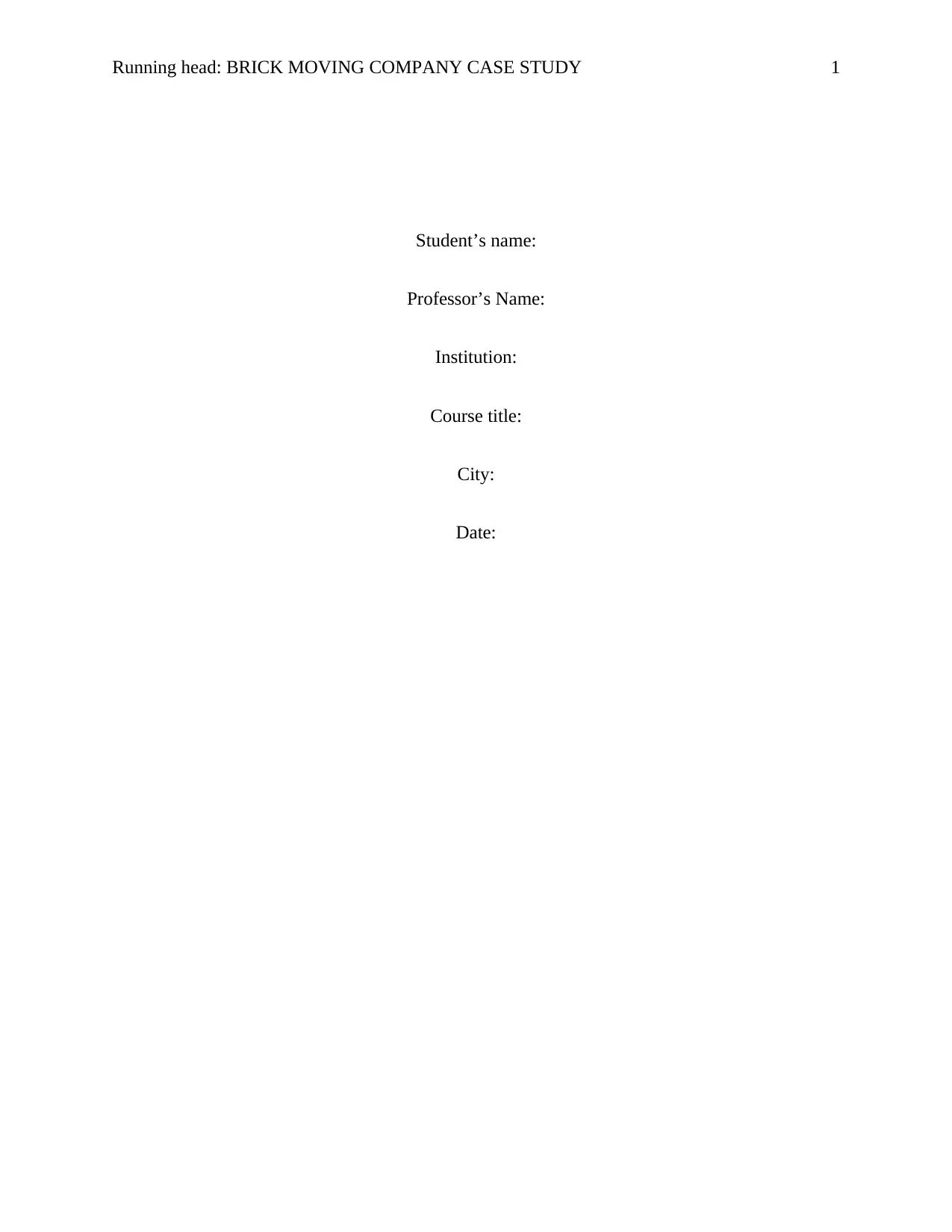
Running head: BRICK MOVING COMPANY CASE STUDY 1
Student’s name:
Professor’s Name:
Institution:
Course title:
City:
Date:
Student’s name:
Professor’s Name:
Institution:
Course title:
City:
Date:
Paraphrase This Document
Need a fresh take? Get an instant paraphrase of this document with our AI Paraphraser
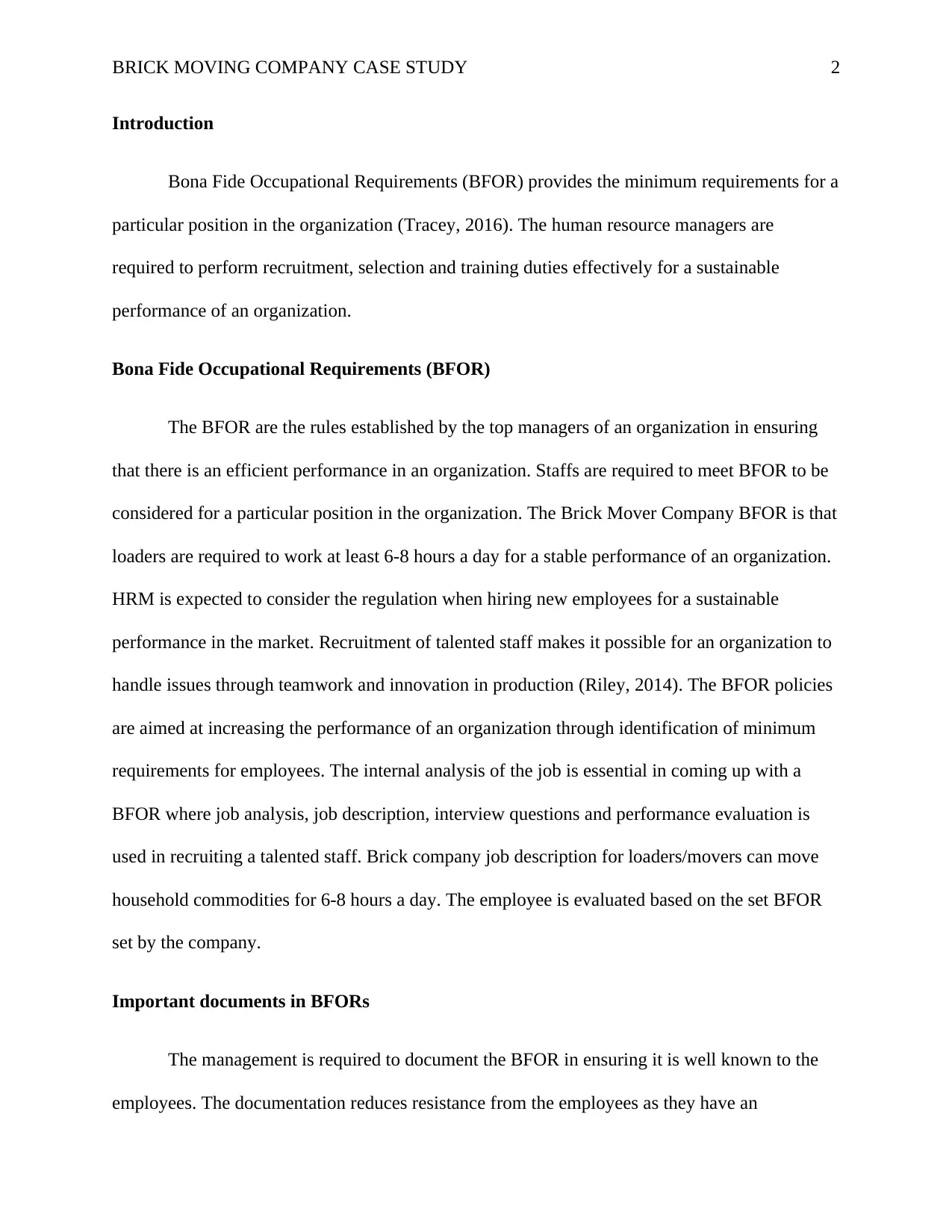
BRICK MOVING COMPANY CASE STUDY 2
Introduction
Bona Fide Occupational Requirements (BFOR) provides the minimum requirements for a
particular position in the organization (Tracey, 2016). The human resource managers are
required to perform recruitment, selection and training duties effectively for a sustainable
performance of an organization.
Bona Fide Occupational Requirements (BFOR)
The BFOR are the rules established by the top managers of an organization in ensuring
that there is an efficient performance in an organization. Staffs are required to meet BFOR to be
considered for a particular position in the organization. The Brick Mover Company BFOR is that
loaders are required to work at least 6-8 hours a day for a stable performance of an organization.
HRM is expected to consider the regulation when hiring new employees for a sustainable
performance in the market. Recruitment of talented staff makes it possible for an organization to
handle issues through teamwork and innovation in production (Riley, 2014). The BFOR policies
are aimed at increasing the performance of an organization through identification of minimum
requirements for employees. The internal analysis of the job is essential in coming up with a
BFOR where job analysis, job description, interview questions and performance evaluation is
used in recruiting a talented staff. Brick company job description for loaders/movers can move
household commodities for 6-8 hours a day. The employee is evaluated based on the set BFOR
set by the company.
Important documents in BFORs
The management is required to document the BFOR in ensuring it is well known to the
employees. The documentation reduces resistance from the employees as they have an
Introduction
Bona Fide Occupational Requirements (BFOR) provides the minimum requirements for a
particular position in the organization (Tracey, 2016). The human resource managers are
required to perform recruitment, selection and training duties effectively for a sustainable
performance of an organization.
Bona Fide Occupational Requirements (BFOR)
The BFOR are the rules established by the top managers of an organization in ensuring
that there is an efficient performance in an organization. Staffs are required to meet BFOR to be
considered for a particular position in the organization. The Brick Mover Company BFOR is that
loaders are required to work at least 6-8 hours a day for a stable performance of an organization.
HRM is expected to consider the regulation when hiring new employees for a sustainable
performance in the market. Recruitment of talented staff makes it possible for an organization to
handle issues through teamwork and innovation in production (Riley, 2014). The BFOR policies
are aimed at increasing the performance of an organization through identification of minimum
requirements for employees. The internal analysis of the job is essential in coming up with a
BFOR where job analysis, job description, interview questions and performance evaluation is
used in recruiting a talented staff. Brick company job description for loaders/movers can move
household commodities for 6-8 hours a day. The employee is evaluated based on the set BFOR
set by the company.
Important documents in BFORs
The management is required to document the BFOR in ensuring it is well known to the
employees. The documentation reduces resistance from the employees as they have an
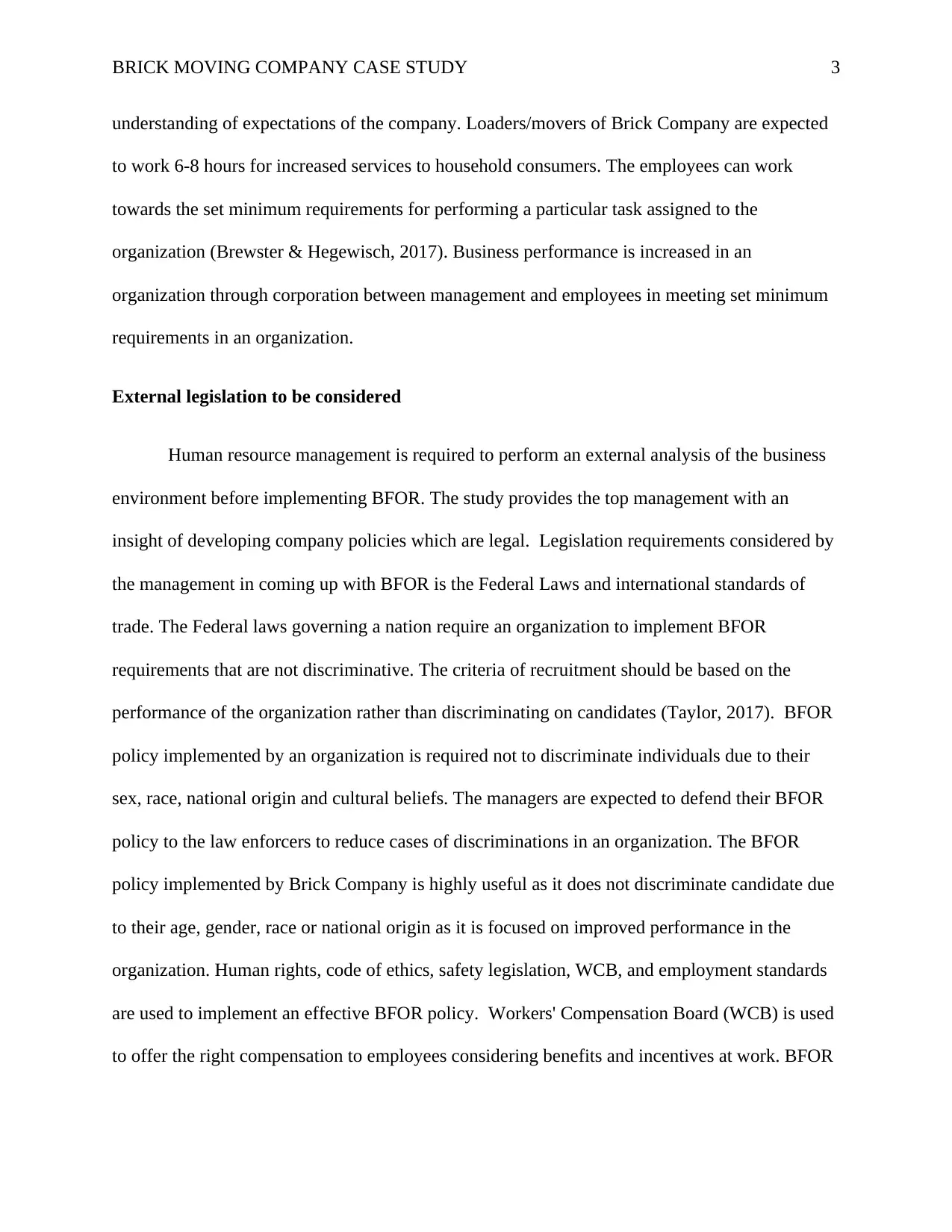
BRICK MOVING COMPANY CASE STUDY 3
understanding of expectations of the company. Loaders/movers of Brick Company are expected
to work 6-8 hours for increased services to household consumers. The employees can work
towards the set minimum requirements for performing a particular task assigned to the
organization (Brewster & Hegewisch, 2017). Business performance is increased in an
organization through corporation between management and employees in meeting set minimum
requirements in an organization.
External legislation to be considered
Human resource management is required to perform an external analysis of the business
environment before implementing BFOR. The study provides the top management with an
insight of developing company policies which are legal. Legislation requirements considered by
the management in coming up with BFOR is the Federal Laws and international standards of
trade. The Federal laws governing a nation require an organization to implement BFOR
requirements that are not discriminative. The criteria of recruitment should be based on the
performance of the organization rather than discriminating on candidates (Taylor, 2017). BFOR
policy implemented by an organization is required not to discriminate individuals due to their
sex, race, national origin and cultural beliefs. The managers are expected to defend their BFOR
policy to the law enforcers to reduce cases of discriminations in an organization. The BFOR
policy implemented by Brick Company is highly useful as it does not discriminate candidate due
to their age, gender, race or national origin as it is focused on improved performance in the
organization. Human rights, code of ethics, safety legislation, WCB, and employment standards
are used to implement an effective BFOR policy. Workers' Compensation Board (WCB) is used
to offer the right compensation to employees considering benefits and incentives at work. BFOR
understanding of expectations of the company. Loaders/movers of Brick Company are expected
to work 6-8 hours for increased services to household consumers. The employees can work
towards the set minimum requirements for performing a particular task assigned to the
organization (Brewster & Hegewisch, 2017). Business performance is increased in an
organization through corporation between management and employees in meeting set minimum
requirements in an organization.
External legislation to be considered
Human resource management is required to perform an external analysis of the business
environment before implementing BFOR. The study provides the top management with an
insight of developing company policies which are legal. Legislation requirements considered by
the management in coming up with BFOR is the Federal Laws and international standards of
trade. The Federal laws governing a nation require an organization to implement BFOR
requirements that are not discriminative. The criteria of recruitment should be based on the
performance of the organization rather than discriminating on candidates (Taylor, 2017). BFOR
policy implemented by an organization is required not to discriminate individuals due to their
sex, race, national origin and cultural beliefs. The managers are expected to defend their BFOR
policy to the law enforcers to reduce cases of discriminations in an organization. The BFOR
policy implemented by Brick Company is highly useful as it does not discriminate candidate due
to their age, gender, race or national origin as it is focused on improved performance in the
organization. Human rights, code of ethics, safety legislation, WCB, and employment standards
are used to implement an effective BFOR policy. Workers' Compensation Board (WCB) is used
to offer the right compensation to employees considering benefits and incentives at work. BFOR
⊘ This is a preview!⊘
Do you want full access?
Subscribe today to unlock all pages.

Trusted by 1+ million students worldwide
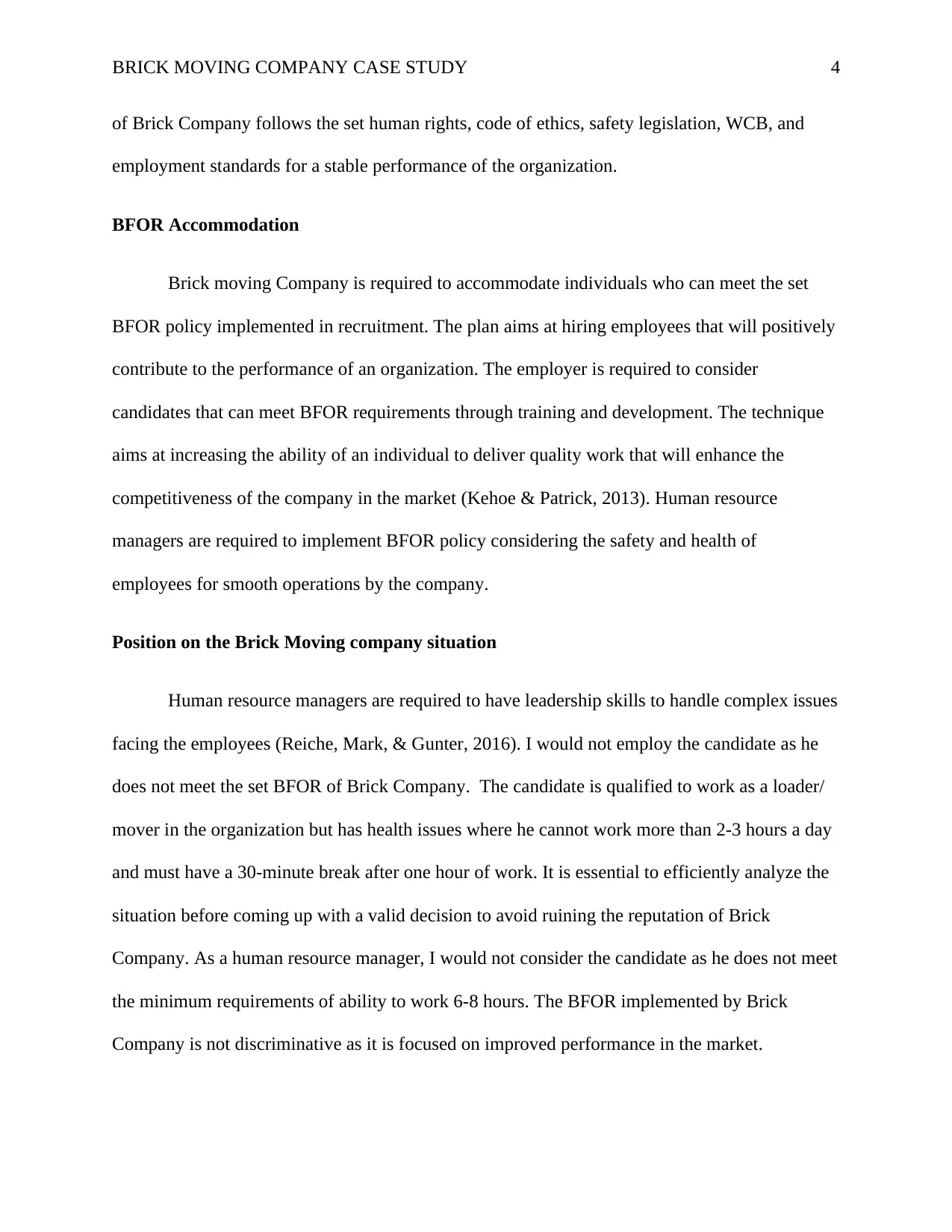
BRICK MOVING COMPANY CASE STUDY 4
of Brick Company follows the set human rights, code of ethics, safety legislation, WCB, and
employment standards for a stable performance of the organization.
BFOR Accommodation
Brick moving Company is required to accommodate individuals who can meet the set
BFOR policy implemented in recruitment. The plan aims at hiring employees that will positively
contribute to the performance of an organization. The employer is required to consider
candidates that can meet BFOR requirements through training and development. The technique
aims at increasing the ability of an individual to deliver quality work that will enhance the
competitiveness of the company in the market (Kehoe & Patrick, 2013). Human resource
managers are required to implement BFOR policy considering the safety and health of
employees for smooth operations by the company.
Position on the Brick Moving company situation
Human resource managers are required to have leadership skills to handle complex issues
facing the employees (Reiche, Mark, & Gunter, 2016). I would not employ the candidate as he
does not meet the set BFOR of Brick Company. The candidate is qualified to work as a loader/
mover in the organization but has health issues where he cannot work more than 2-3 hours a day
and must have a 30-minute break after one hour of work. It is essential to efficiently analyze the
situation before coming up with a valid decision to avoid ruining the reputation of Brick
Company. As a human resource manager, I would not consider the candidate as he does not meet
the minimum requirements of ability to work 6-8 hours. The BFOR implemented by Brick
Company is not discriminative as it is focused on improved performance in the market.
of Brick Company follows the set human rights, code of ethics, safety legislation, WCB, and
employment standards for a stable performance of the organization.
BFOR Accommodation
Brick moving Company is required to accommodate individuals who can meet the set
BFOR policy implemented in recruitment. The plan aims at hiring employees that will positively
contribute to the performance of an organization. The employer is required to consider
candidates that can meet BFOR requirements through training and development. The technique
aims at increasing the ability of an individual to deliver quality work that will enhance the
competitiveness of the company in the market (Kehoe & Patrick, 2013). Human resource
managers are required to implement BFOR policy considering the safety and health of
employees for smooth operations by the company.
Position on the Brick Moving company situation
Human resource managers are required to have leadership skills to handle complex issues
facing the employees (Reiche, Mark, & Gunter, 2016). I would not employ the candidate as he
does not meet the set BFOR of Brick Company. The candidate is qualified to work as a loader/
mover in the organization but has health issues where he cannot work more than 2-3 hours a day
and must have a 30-minute break after one hour of work. It is essential to efficiently analyze the
situation before coming up with a valid decision to avoid ruining the reputation of Brick
Company. As a human resource manager, I would not consider the candidate as he does not meet
the minimum requirements of ability to work 6-8 hours. The BFOR implemented by Brick
Company is not discriminative as it is focused on improved performance in the market.
Paraphrase This Document
Need a fresh take? Get an instant paraphrase of this document with our AI Paraphraser
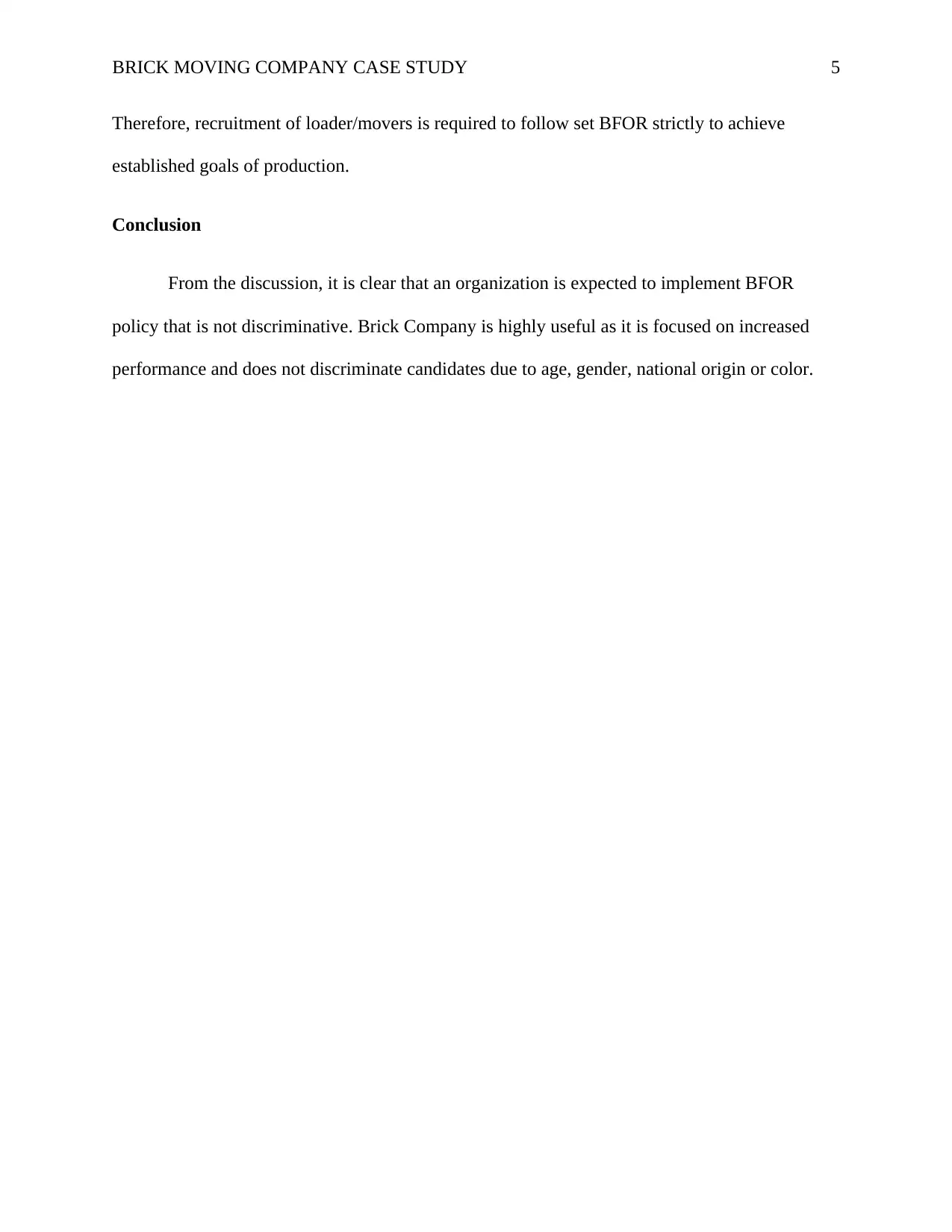
BRICK MOVING COMPANY CASE STUDY 5
Therefore, recruitment of loader/movers is required to follow set BFOR strictly to achieve
established goals of production.
Conclusion
From the discussion, it is clear that an organization is expected to implement BFOR
policy that is not discriminative. Brick Company is highly useful as it is focused on increased
performance and does not discriminate candidates due to age, gender, national origin or color.
Therefore, recruitment of loader/movers is required to follow set BFOR strictly to achieve
established goals of production.
Conclusion
From the discussion, it is clear that an organization is expected to implement BFOR
policy that is not discriminative. Brick Company is highly useful as it is focused on increased
performance and does not discriminate candidates due to age, gender, national origin or color.
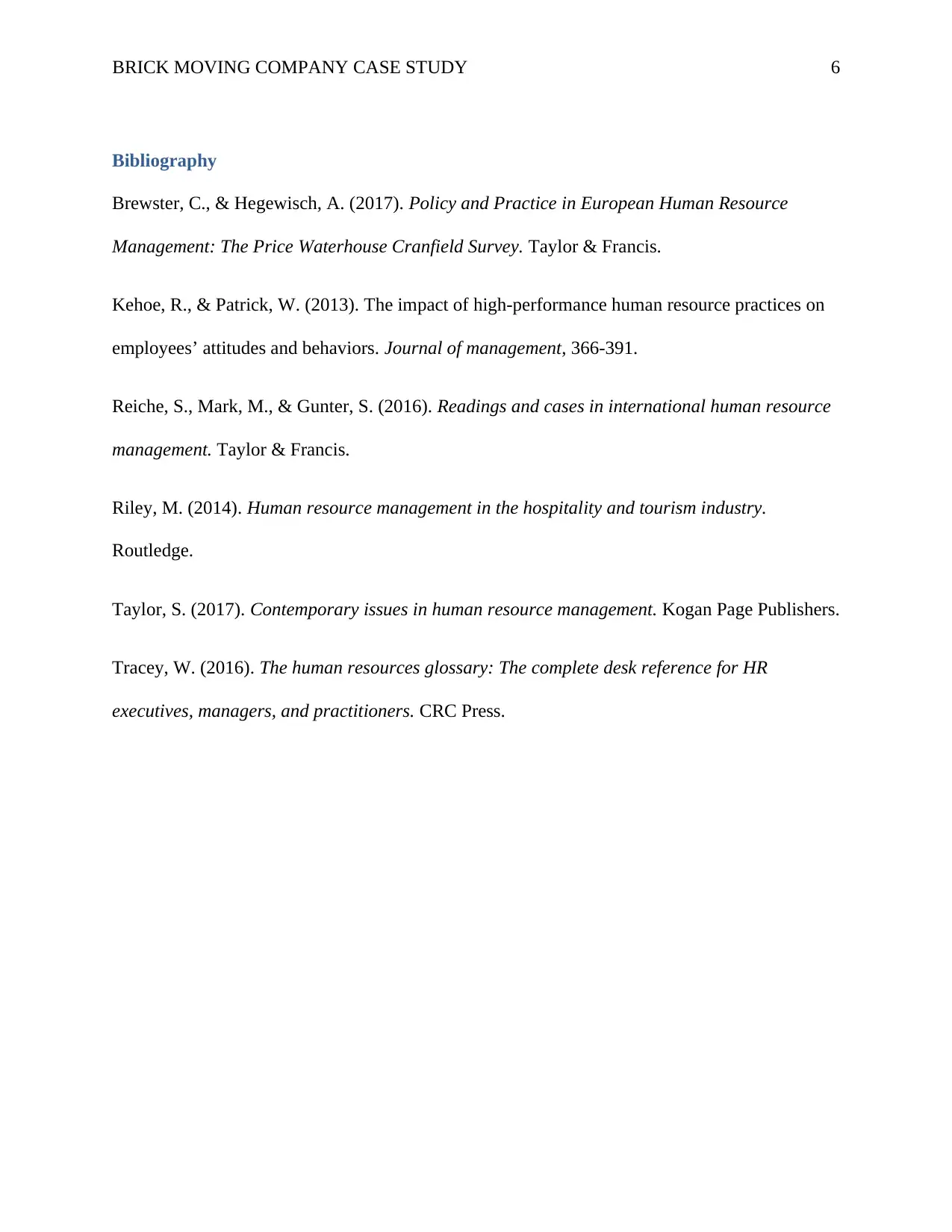
BRICK MOVING COMPANY CASE STUDY 6
Bibliography
Brewster, C., & Hegewisch, A. (2017). Policy and Practice in European Human Resource
Management: The Price Waterhouse Cranfield Survey. Taylor & Francis.
Kehoe, R., & Patrick, W. (2013). The impact of high-performance human resource practices on
employees’ attitudes and behaviors. Journal of management, 366-391.
Reiche, S., Mark, M., & Gunter, S. (2016). Readings and cases in international human resource
management. Taylor & Francis.
Riley, M. (2014). Human resource management in the hospitality and tourism industry.
Routledge.
Taylor, S. (2017). Contemporary issues in human resource management. Kogan Page Publishers.
Tracey, W. (2016). The human resources glossary: The complete desk reference for HR
executives, managers, and practitioners. CRC Press.
Bibliography
Brewster, C., & Hegewisch, A. (2017). Policy and Practice in European Human Resource
Management: The Price Waterhouse Cranfield Survey. Taylor & Francis.
Kehoe, R., & Patrick, W. (2013). The impact of high-performance human resource practices on
employees’ attitudes and behaviors. Journal of management, 366-391.
Reiche, S., Mark, M., & Gunter, S. (2016). Readings and cases in international human resource
management. Taylor & Francis.
Riley, M. (2014). Human resource management in the hospitality and tourism industry.
Routledge.
Taylor, S. (2017). Contemporary issues in human resource management. Kogan Page Publishers.
Tracey, W. (2016). The human resources glossary: The complete desk reference for HR
executives, managers, and practitioners. CRC Press.
⊘ This is a preview!⊘
Do you want full access?
Subscribe today to unlock all pages.

Trusted by 1+ million students worldwide
1 out of 6
Related Documents
Your All-in-One AI-Powered Toolkit for Academic Success.
+13062052269
info@desklib.com
Available 24*7 on WhatsApp / Email
![[object Object]](/_next/static/media/star-bottom.7253800d.svg)
Unlock your academic potential
Copyright © 2020–2026 A2Z Services. All Rights Reserved. Developed and managed by ZUCOL.




